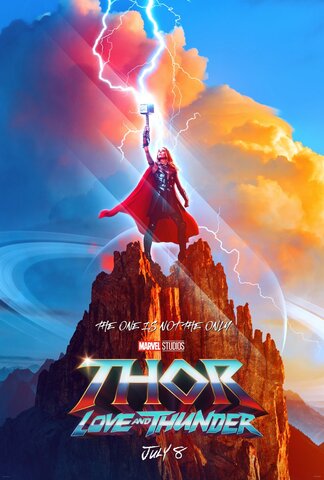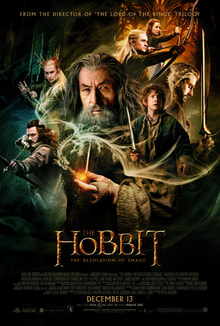The Oscar Project Reviews

Thor is back and I wish I could say better than ever, but unfortunately Love and Thunder leaves a bit to be desired.
Much was made of the return of Natalie Portman to the Thor franchise, and it was great to see her back on screen, and even better to see her don the Thor armor and wield Thor’s legendary hammer Mjolnir. But the truth of this film is that it feels like an awkward follow-up to what was an excellent previous installment in Thor: Ragnarok. The film picks up with Thor as he tries to figure out what to do with his life after Avengers: Endgame where he left with the remaining Guardians of the Galaxy and while they figured prominently in the trailers promoting the film, I’ll disappoint any Guardians fans by letting you know they disappear about 15 minutes into the film. Don’t worry, they will be back with their holiday special on Disney+ and another theatrical film in the works, but Chris Pratt has been busy with Amazon lately, so the Guardians scenes in this film are pretty limited. The other high point of the film is Christian Bale’s Gorr the God Butcher. The film actually opens with his backstory and I wish we’d gotten more about his character. We quickly understand his motivations from the opening scenes of the film, but there was so much more they could have done with the character. His lines are sparse and Bale delivers them with his typical dedication to the material, but I couldn’t help hearing Bruce Wayne/Batman in some of his scenes.
Thor: Love and Thunder is still a fun film. There are plenty of new characters introduced and we may look back in five years’ time with a different lens after seeing what else has transpired in the MCU, but for now this film didn’t quite reach its full potential.
6 out of 10
0 Comments
 While the film is now nearly a decade old, some of the annoyances remain, but the film as a whole remains a solid adaptation of excellent source material. Why The Hobbit novel was distributed across three films is still a mystery to me, but watching this for a second (or maybe third) time, I appreciate the level of detail Jackson includes. It makes more sense to watch this trilogy AFTER the Lord of the Rings trilogy of a decade prior even though the events happen many years before The Lord of the Rings. There are many callbacks to the earlier films, and a few subtle hints to the events that follow in the timeline of Middle Earth, even while the story of Bilbo and the Dwarves is unfolding near Laketown and The Lonely Mountain. The cast in the film is outstanding, particularly Benedict Cumberbatch as the titular dragon, Smaug. Cast in this role prior to his success in the Marvel films as Dr. Steven Strange, Cumberbatch brings a true menace to the character which can't be understated. Martin Freeman's reprisal of Bilbo from the first film holds the piece together and it is always welcome to see Sir Ian McKellan gracing the screen as Gandalf. A fitting cameo from Cate Blanchett as Lady Galadriel and a strong performance from Luke Evans as Bard of Laketown help bolster this roster. The dwarves themselves tend to blend together as they did in the first film, but Richard Armitage stays strong as their leader Thorin. The Desolation of Smaug is a stunningly beautiful film, as are all Peter Jackson's films set in Middle Earth. It was true serendipity that Jackson hails from New Zealand, the country probably most analogous to Tolkien's world that we have in our earth. While there are plenty of wonderful vistas, there are also plenty of times when the true beauty of the land is enhanced through technological means. Unfortunately, this often comes at the cost of being compared with The Lord of the Rings, which set the bar so high as to be unreachable by anything else. The only other place where Desolation of Smaug falls a bit short is in the screenplay. It is too long, and spends too much time making big deals out of small passages (or non-existent ones) from the book. I understand that Jackson was given carte blanche in making these films, but this is one instance where less would probably have been more. I've long argued that these films should have been a duology at most, and the padding included in this installment just speaks even more to that theory. In the end, The Hobbit: The Desolation of Smaug is a passable film with good performances from some excellent actors. The choices that bring it down a notch happened well before filming ever started and the filmmakers involved with the production provided their best with the material at their disposal. 7 out of 10 |
Archives
October 2023
Categories
All
|
 RSS Feed
RSS Feed